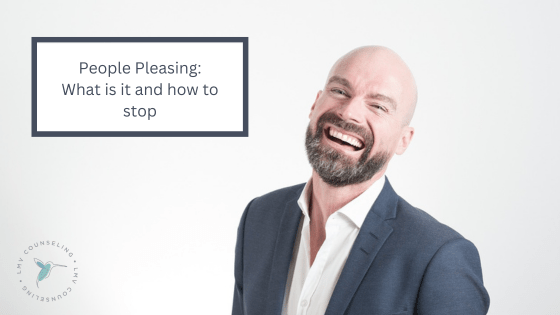Do you often find yourself saying yes to things you don’t really want to do? Do you go out of your way to make others happy, even if it means sacrificing your own needs and desires? If so, you may be a people pleaser.
What is People Pleasing?
People pleasing is a common behavior that many of us engage in, often without even realizing it. It’s the tendency to prioritize the needs and wants of others over our own, in an effort to gain approval and avoid conflict. While there’s nothing wrong with being kind and considerate, people pleasing can become problematic when it starts to impact our well-being and relationships.
For many, this shows up in small to big interactions with people. For example, it may prevent you from speaking up at the coffee shop when they give you the wrong order. Or you go along with the decisions your romantic partner makes and you develop resentment over the years.
So, what can we do to stop people pleasing and start taking care of ourselves?
Identifying People Pleasing Behaviors
Before we can address people pleasing behaviors, we need to understand what they look like. Here are some common signs that you may be a people pleaser:
- Saying yes to everything, even when it’s not in your best interest
- Avoiding conflict and confrontation, even when it means sacrificing your own needs
- Feeling guilty or anxious when you say no or assert your own needs
- Constantly seeking approval and validation from others
- Neglecting your own self-care and well-being in order to help others
If you identify with any of these behaviors, it may be time to take a closer look at your people pleasing tendencies.
Breaking the People Pleasing Cycle
Here are some tips for breaking the cycle of people pleasing and prioritizing your own needs:
1. Identify your values: Take some time to reflect on your personal values and what’s important to you. Once you have a clear understanding of your values, it can be easier to make decisions that align with them, rather than constantly trying to please others.
2. Practice saying no: Saying no can be hard, especially if you’re used to always saying yes. However, learning to set boundaries and say no when something doesn’t align with your values or needs is an important part of self-care. Practice saying no in low-stakes situations, such as declining an invitation to a social event you’re not interested in attending.
3. Prioritize self-care: Self-care is essential for our physical and emotional well-being. Make sure to prioritize activities that bring you joy and help you recharge, such as exercise, meditation, or spending time in nature.
4. Practice self-compassion: It’s important to be kind to ourselves, especially when we’re trying to break long-standing patterns of behavior. Practice self-compassion by acknowledging that it’s okay to make mistakes and that you’re doing the best you can.
5. Seek support: Breaking the cycle of people pleasing can be challenging, and it’s okay to seek support from a therapist or trusted friend or family member. A mental health professional can help you identify patterns of behavior, develop coping strategies, and practice self-care.
Breaking the cycle of people pleasing can be a challenging process, but it’s essential for our well-being and relationships. By identifying your values, practicing self-care, and learning to say no, you can start prioritizing your own needs and living a more fulfilling life. Remember, it’s okay to put yourself first sometimes – you deserve it.
If you have trouble with this you’re not alone. Go deep into breaking the cycle and heal from people pleasing behaviors for good. Get Started Now with a LMV Counseling trusted licensed therapist.

